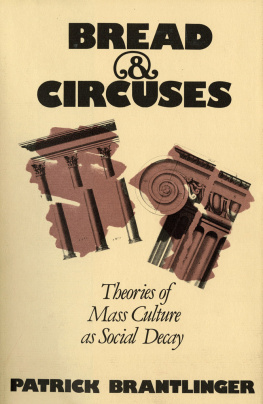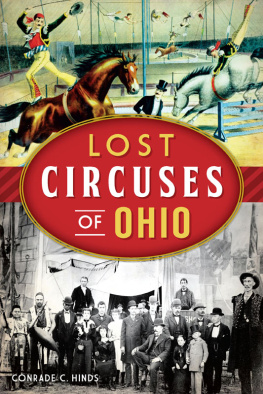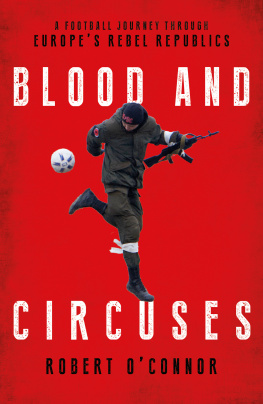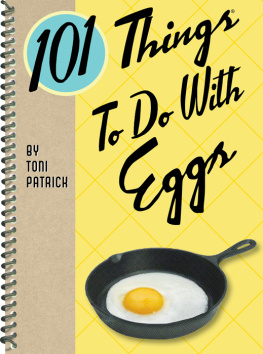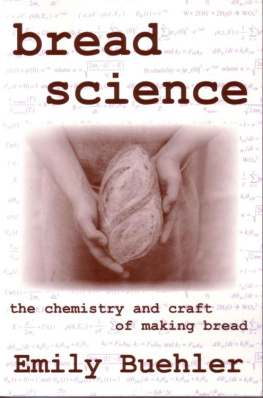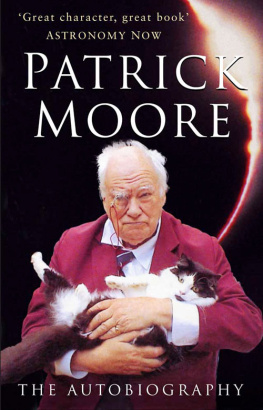Patrick Brantlinger - Bread & Circuses
Here you can read online Patrick Brantlinger - Bread & Circuses full text of the book (entire story) in english for free. Download pdf and epub, get meaning, cover and reviews about this ebook. year: 2016, publisher: CORNELL UNIVERSITY PRESS, genre: Science. Description of the work, (preface) as well as reviews are available. Best literature library LitArk.com created for fans of good reading and offers a wide selection of genres:
Romance novel
Science fiction
Adventure
Detective
Science
History
Home and family
Prose
Art
Politics
Computer
Non-fiction
Religion
Business
Children
Humor
Choose a favorite category and find really read worthwhile books. Enjoy immersion in the world of imagination, feel the emotions of the characters or learn something new for yourself, make an fascinating discovery.
- Book:Bread & Circuses
- Author:
- Publisher:CORNELL UNIVERSITY PRESS
- Genre:
- Year:2016
- Rating:4 / 5
- Favourites:Add to favourites
- Your mark:
- 80
- 1
- 2
- 3
- 4
- 5
Bread & Circuses: summary, description and annotation
We offer to read an annotation, description, summary or preface (depends on what the author of the book "Bread & Circuses" wrote himself). If you haven't found the necessary information about the book — write in the comments, we will try to find it.
Bread & Circuses — read online for free the complete book (whole text) full work
Below is the text of the book, divided by pages. System saving the place of the last page read, allows you to conveniently read the book "Bread & Circuses" online for free, without having to search again every time where you left off. Put a bookmark, and you can go to the page where you finished reading at any time.
Font size:
Interval:
Bookmark:
BY THE SAME AUTHOR
The Spirit of Reform:
British Literature and Politics,
18321867
Cornell University Press gratefully acknowledges a grant from the Andrew W. Mellon Foundation that aided in bringing this book to publication.
Copyright 1983 by Cornell University
All rights reserved. Except for brief quotations in a review, this book, or parts thereof, must not be reproduced in any form without permission in writing from the publisher. For information, address Cornell University Press, Sage House, 512 East State Street, Ithaca, New York 14850.
E-book edition 2016 by Cornell University Press
ISBN 978-1-5017-0763-6
Visit our website at www.cornellpress.cornell.edu.
The text of this book is licensed under a Creative Commons Attribution-NonCommercial-NoDerivatives 4.0 International License: https://creativecommons.org/licenses/by-nc-nd/4.0/
For Andy, Susan, and Jeremy
FOR better or worse, the most powerful, influential instruments for the dissemination of values, knowledge, and art are today the mass media. Among artists and intellectuals, the cultural domination of radio, film, and television is normally viewed with apprehension. Teachers of literature, for example, often express the fear that books are an endangered species, that literacy is dying out, that it is giving way to what Jerzy Kosinski calls videocy. Political theorists on both the right and the left argue that the mass media are totalitarian rather than democratic, that they are a majorperhaps the majordestroyer either of individualism or of community. Often these apprehensions are expressed in terms of a mythology that I call negative classicism, according to which the more a society comes to depend on mass culture, the more it falls into a pattern of decline and fall once traced by Rome and perhaps by other extinct civilizations. These apprehensions are not necessarily mistaken, but the mythology of negative classicism tends to obscure what is new and potentially liberating in our present situation.
The purpose of this book is to criticize negative classicism as it has been applied to mass culture not just in our electronic present but over the last two centuries. The most recent bread and circuses responses to television and the welfare state are hardly new; they echo the reactions of artists and intellectuals from as long ago as Juvenals age to the entry of the common people into the cultural arena, or to the imposition on society of a centralized or mass-produced culture. Negative classicism is the product of several traditions of culture theory, from offshoots of Burkean conservatism to the esthetic postulates of Marxism. My hope is that a critique of the mythology of negative classicism will help to open the way for new ideas about culture and society.
I do not wish to revive or defend older forms of culture, either high or mass, any more than I wish to champion the electronic mass media as they are now employed in both capitalist and socialist countries to distract, to narcotize, to sell toothpaste and beer, fascism and Soviet Marxism. The two major arguments in defense of the mass media which have developed over the last twenty years I find largely unacceptable. The first line of defense is that of Marshall McLuhan and his disciples; the second is the case for cultural pluralism as fully compatible withindeed, as partly a product ofthe mass media, an argument that Herbert Gans, for example, makes in Popular Culture and High Culture. terms of empire and decadence, bread and circusesas in Herbert Marcuses One-Dimensional Man.
In my own reading and thinking about the mass media, I have wished to find some theory that would convince me that, somehow or other, in some not too remote future, mass culture and democratic community will coincide. They promise to do so, as Raymond Williams, among other theorists, has suggested; but that promise seems to recede just as fast as the mass media achieve new levels of power, influence, and sophistication. Given this disillusioning pattern, we may indeed be justified in using some version of negative classicism to understand where the mass media are leading us. But whatever liberating potential there may be in the technology of the media counts for little in an apocalyptic mythology that reads the doom of empires in what seem to be among the most constructive, original developments of the age. How can this contradiction be understood? The history of theories about mass culturewhich is more often than not the history of negative classicism, Roman analogizing, bread and circusesmay provide at least some clues to the future toward which the mass media are propelling us, or to the future we may create for ourselves through learning to use the mass media in democratic ways.
Many people and several institutions have helped me complete this project. I am grateful to the John Simon Guggenheim Memorial Foundation; their fellowship allowed me to spend 1978-79 at the University of California, Berkeley, beginning research that must have sounded strange and unlikely at the proposal stage. I am also grateful to Kenneth Gros Louis, John Reed, Jerome Buckley, and Patrick McCarthy for their support in the early going, and to Indiana University for the leave without pay and Summer Faculty Fellowships that added both free time and financial support to the Guggenheim.
I went to Berkeley in part because the University of California is blessed with two scholars, Leo Lwenthal and Martin Jay, who know more about the history of the Frankfurt Institute than anyone else. They offered me their time, ideas, criticisms, and even their libraries with great generosity. Both read parts of this book in early and embarrassingly rough drafts, and both offered suggestions that were astute, usable, and yet also encouraging.
OthersEllen Anderson Brantlinger, Martha Vicinus, Eugene Kintgen, and Matei Calinescualso read and criticized parts of this book at various stages. I am grateful to all of them, but especially to Ellen and Matei. Ellen not only helped and encouraged me in numerous ways, but patiently endured a good deal of absent-mindedness, sloppy housekeeping, and plain blue funk from me while I was writing. With his criticisms and suggestions about new books and articles to read, Matei helped me to sharpen most of the chapters, focusing my attention on the paradox of progress as decadence.
Some of the ideas in this study I first tried out in a graduate course at Indiana: L680, Literary Theory. I team-taught that course with Christoph K. Lohmann, whose knowledge of American writers helped me at the start of this project. During the semester we taught together, Chris brought many of my thoughts about mass culture into better focus. I also imagine that many of the comments and questions of our L68o students are registered in this book. Other students and colleagues have helped with suggestions, information, conversation, research, translating, and typing, including Marilyn Breiter, Joan Corwin, Linda David, Joseph Donovan, John Eakin, Catherine Gallagher, Camille Garnier, Daniel Granger, Donald Gray, Raymond Hedin, Joonok Huh, Lewis Miller, James Naremore, Robert Nowell, Marsha Richmond, Sheldon Rothblatt, Scott Sanders, Michael Sheldon, Anthony Shipps, Robert Smith, Elisa Sparks, Lee Sterrenburg, Paul Strohm, Timothy Wiles, and John Woodcock. I also thank Jerzy Kosinski for coming to my aid when a journal mangled an essay of mine, the better parts of which I have revived in this book. And both David Riesman and Michael Grant generously answered my requests for information.
Whom have I left out? Perhaps our television set, but it is occupied most of the time when I want to watch it by Andy, Susan, and Jeremy (no, they have not been transmogrified into videots," and they are not usually barbarians" either). I suppose I have them to thank for keeping me at work those evenings when what I wanted to watch was not what they were watching. And I can be even more thankful to them for another reason: someday they may read this book and understand why I wrote it for them.
Next pageFont size:
Interval:
Bookmark:
Similar books «Bread & Circuses»
Look at similar books to Bread & Circuses. We have selected literature similar in name and meaning in the hope of providing readers with more options to find new, interesting, not yet read works.
Discussion, reviews of the book Bread & Circuses and just readers' own opinions. Leave your comments, write what you think about the work, its meaning or the main characters. Specify what exactly you liked and what you didn't like, and why you think so.

